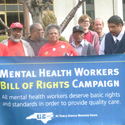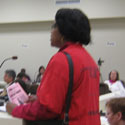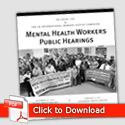

March 12, 2012—UE Local 150 mental health workers from across North Carolina gathered at the state legislature on Tuesday, March 13 and delivered a strong message to the Joint Legislative Oversight Committee on Health and Human Services. That message, delivered through a press conference, media coverage and a silent protest inside the committee meeting, was "Listen to Workers." The union members were joined by Rev. William Barber II, president of the North Carolina NAACP and delivered 2,000 post cards demanding the passage of Mental Health Workers Bill of Rights (House Bill 287, Senate Bill 481) [read more]

UE150 held two major public hearings as part of the Mental Health Workers bill of Rights campaign in Butner, NC on November 20, 2010 and in Goldsboro, NC on February 5, 2011. The purpose of the hearings was threefold: 1) to present further evidence of the need for collective bargaining rights in the public sector; 2) to provide a public forum for issues impacting thousands of mental health workers and patients caused by the state’s failed 2001“reform plan” and calling for a legislative Mental Health Workers Bill of Rights; and 3) demand that the state government no longer balance the budget by cutting vital services and jobs. Before a crowd of more than 100 people, which included members of the mainstream and independent media, patient advocates and the broader community, mental healthcare workers from six (6) state facilities in the Department of Health and Human Services gave testimony about their working conditions. [permalink]

On September 20, 2010, the Town of Chapel Hill, NC, suspended and began an investigation of Solid Waste Operators Clyde Clark and Kerry Bigelow, just one business day after they filed health and safety grievances. Clark and Bigelow have been raising concerns regarding racism, health and safety issues, and abusive management. A letter from the Town claimed that there were "complaints" about union stewards Clark and Bigelow but they were never notified of even one complaint. They were banned from town property with no explanation and were told that could not grieve this retaliatory suspension, because the Town views this as a "Non-disciplinary Suspension"... [read more]


UE Local 150 has won a ruling that three workers at Central State Regional Hospital were unjustly fired. In a case that the union fought through the grievance procedure for nearly two years, a state administrative law judge ruled on September 20 that the state Department of Health and Human Services (DHHS) did not have just cause to fire nurse Patricia Swann and health care technicians John Long Jr. and Fred Gooch. He ordered the workers reinstated and made whole for their losses, including back pay and legal fees. [read more]


On Wednesday, January 14, 2010, UE 150 members from three DHHS institutions—Central Regional Hospital, Dorothea Dix Hospital, and Cherry hospital—testified before the NC Joint Legislative Oversight Committee on Mental Health, Developmental Disabilities and Substance Abuse Services. Wearing red in a show of unity, the workers bore witness to the horrible human damage caused by the so-called "Zero Tolerance" Policy, as well as the need for collective bargaining rights. [read more]

West Virginia state employees, led by UE Local 170, have won the right to have union stewards represent them in interviews where administrators are conducting investigations. The state's Public Employees Grievance Board ruled that if an official conducting an "investigatory interview" can decide disciplinary action, the employee can bring a union representative to the meeting. [read more]


On Monday, August 3, Mental Health Care Tech Donnell Cooley was assaulted by a patient while working at Central Regional Hospital (CRH) in Butner, NC. He was punched 4-5 times in the face, which resulted in a broken orbital bone (eye socket), fractured upper jaw, and injured nose and eyes. His glasses were also broken and his sight was impaired.
The other workers present at the time were not able to respond in a timely manner to intervene because of the overwhelming fear of doing an improper hold or restraint, like those that have resulted in the loss of many CRH workers' jobs recently. [read more]

The movement to win collective bargaining rights for North Carolina public sector workers continues in the state legislature, during this long session that began at the end of January with the introduction of both House and Senate bills to repeal the state's ban on collective bargaining rights.
During the 2007–2008 session, House Bill 1583 got support in the Judiciary II Committee but did not make it to the floor of the General Assembly. The corporate lobbyists hoped that this would effectively defeat and silence the legislative support as well as the movement for collective bargaining rights among rank-and-file workers and their communities. Neither was true. [read more]

